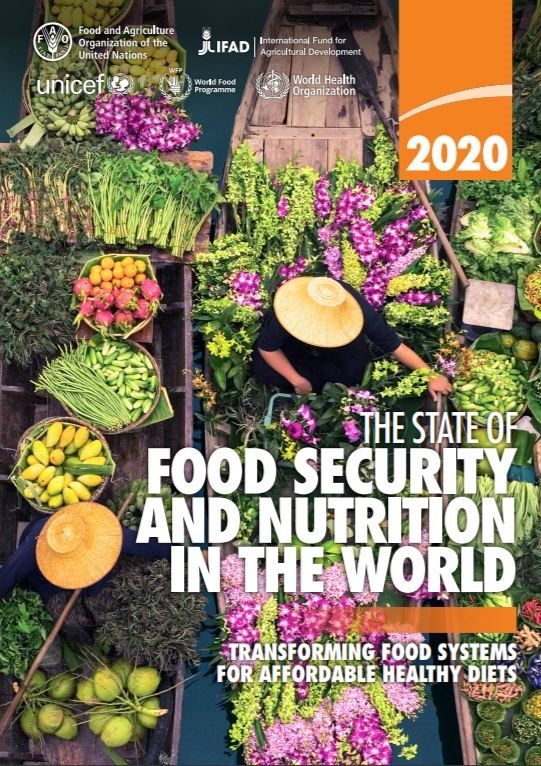ECOSOC at 80: Renewing Multilateralism in an Age of Global Uncertainty
On 23 January, the United Nations Economic and Social Council (ECOSOC) convened a commemorative session…
The SOFI 2020 Report is clear – global hunger remains entrenched, large numbers of the world’s population have little or no access to regular, safe and nutritious food, a situation that has been gravely exacerbated by the onset of COVID-19. Global efforts to end hunger, food insecurity and all forms of malnutrition need to be intensified.
Launched during the 2020 session of the United Nations High Level Political Forum, the report on the State of Food Security and Nutrition in the World 2020 presents the most recent and authoritative estimates of the extent of hunger, food insecurity and malnutrition around the world. This year, the report includes a special focus on transforming food systems for affordable healthy diets.
 The report indicates that “since 2014 the numbers of the world’s hungry have continued to slowly rise. Prior to the COVID-19 pandemic, almost 690 million people, or 8.9 percent of the global population, were undernourished. The new estimate for 2019 has revealed that an additional 60 million people have become affected by hunger since 2014. If this trend continues, the number of undernourished people will exceed 840 million by 2030. Preliminary projections based on the latest available global economic outlooks, suggest that the COVID-19 pandemic may add an additional 83 to 132 million people to the ranks of the undernourished in 2020”.
The report indicates that “since 2014 the numbers of the world’s hungry have continued to slowly rise. Prior to the COVID-19 pandemic, almost 690 million people, or 8.9 percent of the global population, were undernourished. The new estimate for 2019 has revealed that an additional 60 million people have become affected by hunger since 2014. If this trend continues, the number of undernourished people will exceed 840 million by 2030. Preliminary projections based on the latest available global economic outlooks, suggest that the COVID-19 pandemic may add an additional 83 to 132 million people to the ranks of the undernourished in 2020”.
Added consequences of the devastating economic impacts of COVID-19, has been the loss of major sources of income and the reduction in quantity and quality of food for millions. Access to safe and nutritious foods has been severely affected and, in some cases, eliminated. It is the world’s most vulnerable, among them women, children, elderly, migrants, informal sector workers – who mostly suffer from the lack of access to food and poor diets.
Hunger remains entrenched because of persistent poverty, social and economic exclusion, lack of social protection programmes, poor governance, high cost of nutritious foods – too many people cannot afford even the cheapest of healthy diets – and a range of other factors. This is a problem that affects people from all over the world, in both developed and developing countries. This is not a one size fits all problem and the solution can therefore not be a one size fits all solution.
Political commitment is a must. Governments must scale up partnerships with the private sector, NGOs, scientific and academic communities, and all stakeholders to assess country specific challenges and develop appropriate strategies to tackle the problem. Making healthy diets more affordable must be linked to greater job creation and efforts to reduce inequality. Greater financial and infrastructural investment must be made in food security and sustainable development.
As the agenda is set for the first UN Food Systems Summit, which will take place in 2021, this is an opportunity to identify the strengths and weaknesses throughout the food system as magnified by the COVID-19 pandemic. Strengths must be expanded and provided with the necessary resources to be upheld while creative and innovative measures must be used to address weaknesses and gaps. Technology and cross sectoral policy coherence are also crucial factors, particularly with the health sector.
The Food System Summit must help us understand and transform our global food system in a manner which will allow the world to accelerate efforts towards achieving the SDGs while simultaneously catering for tailored responses to country specific challenges.
And for those of us who are lucky enough to have access to regular, safe, and nutritious food, we must learn how to respect food and reduce food waste and food loss.